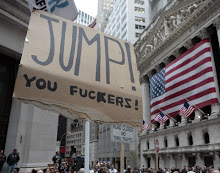"We fell under the leadership of those who would compromise with truth in the past in order to make peace in the present and guide policy in the future." - W.E.B. Du Bois
"The traditions of all dead generations weighs like a nightmare upon the brains of the living." - Karl Marx
It may seem odd that I post a paper on Reconstruction but I would beg to differ and argue that the issue is very relevant to American politics today and always has been. It brings up the role of the federal government, grassroots struggles, civil rights, expanding democracy, the historical significance of Barack Obama's election, and the horrible discussion and attachment in the mainstream media of this "team of rivals" theory of Lincoln's cabinet and advisory staff. I especially think this is important because of the frighteningly popular grip the "Lost Cause" view of the Civil War (and Reconstruction) has on Americans today. As Studs Terkel commented about Americans having worse "amnesia" than himself, a 90+ year old man, for not picking Lincoln as our greatest president (and also not having FDR in the top 10) in a recent national survey.
There are important political implications for this, but to boil it down simply - its the effect of the North's capitulation (due to the rising domination and coopting of the Republican party by purely profit-driven capital interests) to the interests of Southern whites (particular the power of the elites), films like "the Birth of a Nation" and "Gone With the Wind" and the resurgence of the Klan in the 1920's; and the recent wave of reaction ignited by the Nixon presidency and accelerated in the actual reactionary fervor that was the Reagan presidency and the coalition of greedy yuppies, white racist fundamentalists, and military hawks. Its a view of the civil war that nitpicks at any criticism of the Union (or outright fabricates or exaggerates some) and conveniently ignores any flaws of the confederacy and somehow glosses over slavery. They say that the Confederates were not fighting for slavery, but for state's rights or that slavery just had nothing to do with the causes of the Civil War. They exaggerate military heroism and the strategy of generals (Lee, in particular) and ignore the ideology, political, social, and economic consequences of the greatest revolution of the 19th century. Not to mention, a very conspicuously selective neglect of black military courage and heroism that would fit and exceed even their standards.
Anyways, one can begin to see the logical applications of this viewpoint on modern-day American political and social issues. The idea of "state's rights" is constantly invoked, first to protect Jim Crow, and once that was smashed, to effectively try to reverse as much of the gains of the Civil Rights Movement (and consequently, the labor and women's movements). It celebrates white planters and ignores the valiant and very worthy of myth and praise struggles of slaves in rebellion, free black troops and abolitionist agitators, and great leaders like Abraham Lincoln and Frederick Douglass. To keep it short - which narrative lays claim to popular historical memory has very important implications for American's consciousness and political policy.
We must be vigilant about celebrating the truth about the Civil War and Reconstruction. That the war was about slavery, that struggle from the slaves' themselves constituted the largest slave rebellion in world history and led to the emancipation proclamation and black enlistment. That a president like Abraham Lincoln is the greatest president in United States history, and was far more revolutionary and radical than any of the founding fathers. Also, that Lincoln would never had been pushed into doing what he did without the courageous political leadership and agitation of Abolitionist and Radical Republican leaders, foremost among them being Frederick Douglass. We recognize that poor white southerners who fought for the Confederacy saw no material benefit from slavery, however, fighting for the Confederacy was inescapably a fight led by the slaveholding class to form a slave society that aggressively sought to protect and expand slavery and the racial hierarchy of the old order of the South. There were poor whites in seceding states who resisted their neighbors and the Confederate government to remain loyal to the Union (i.e. West Virginia) - and those should be the only ones venerated. As you will read in the paper, Radical Reconstruction must be celebrated as an all-too-brief, revolutionary period in American democracy - with politically and economically mobilized freedpeople at the vanguard.
It's no coincidence that when civil rights struggles are going on in the south there is a corresponding surge in Confederate symbols and celebration of Rebel Heroes to inspire white reaction and maintain the status quo (or turn the clock backwards). The Confederate flag is a disgusting symbol of genocide, slavery, and a continued commitment to racism and hatred and firmly belongs in the dustbin of history. Anyways, hopefully you guys read the paper and it is worthy of your time. It was my final paper for my Civil War Era class, so I put my best effort into it. This is the first time I've tried this but there will be more to come.
Here it is: 40 Acres and A Mule
In Solidarity,
-Steve
P.S. Everyone should also check out Kyle's paper about the Richmond bread riots of 1863. Not only are the riots an interesting story of Civil War history that shatter the romantic illusions of the Confederacy and old southern society, but that the politics and ideology of the Confederacy were inherently backwards and that struggle from the inside contributed to its downfall. Anyways, check it: Bread Riots



